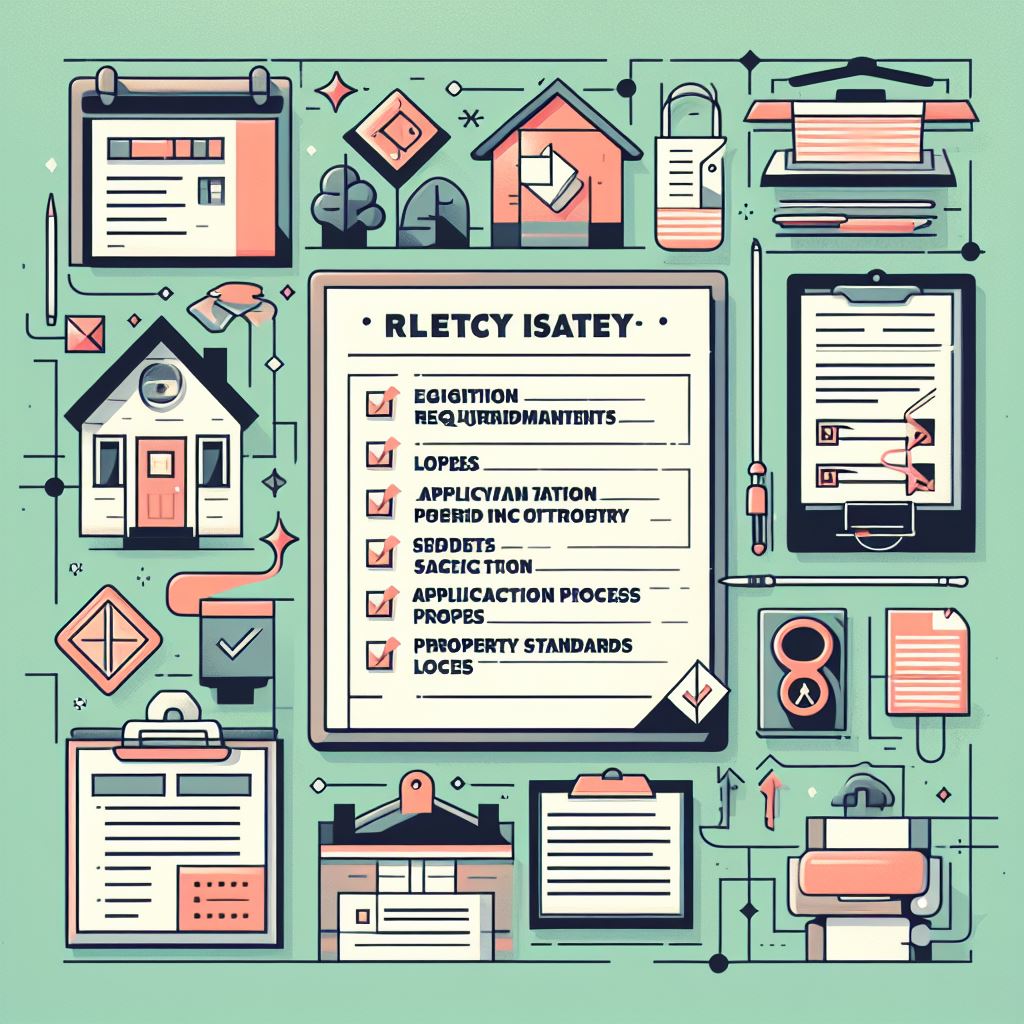Mastering Section 8 Rules: A Comprehensive Checklist

Are you struggling to navigate the complexities of Section 8 rules? Don’t worry, we’ve got you covered.
In this comprehensive checklist, we’ll break down the key requirements and guidelines to help you master the Section 8 program.
From tenant eligibility to rent determination, property inspections to lease agreements, we’ll provide you with the knowledge and tools you need to ensure compliance and maximize your success.
Get ready to conquer Section 8 with confidence.
Key Takeaways
- Tenant eligibility requirements include income eligibility, U.S. citizenship or eligible immigration status, documentation for identity verification, a clean criminal record, and accurate application information.
- Rent determination and payment process involves calculating rent based on income and local market rates, with tenants responsible for paying their portion of rent directly to the landlord, and the PHA paying the remaining portion directly to the landlord.
- Property inspection guidelines ensure that rental units meet quality and safety standards, including compliance with building codes and Housing Quality Standards (HQS).
- Lease agreements and lease renewals require reviewing and complying with Section 8 lease agreement requirements, including necessary information, communication with tenants about renewal options and changes, and following proper procedures for renewal while maintaining accurate documentation.
Tenant Eligibility Requirements
To qualify for Section 8 assistance, you must meet the tenant eligibility requirements set forth by the U.S. Department of Housing and Urban Development. These requirements are in place to ensure that the limited resources available for housing assistance are allocated to those who truly need it.
The first requirement is income eligibility. Your household income must fall below a certain threshold, which is determined based on the area you live in and the size of your family. Additionally, you must be a U.S. citizen or have eligible immigration status. You must also provide documentation to verify your identity, such as a valid driver’s license or passport.
Another crucial requirement is a clean criminal record. Certain criminal activities, such as drug-related offenses or violent crimes, can disqualify you from receiving Section 8 assistance. Finally, you must also provide accurate and truthful information on your application and comply with all program rules and regulations.
Meeting these tenant eligibility requirements is the first step towards securing Section 8 assistance. Once you have met these requirements, the next step is to understand the rent determination and payment process.
Rent Determination and Payment Process
Understanding the process for determining rent and making payments is essential for mastering the Section 8 rules. Here is a comprehensive checklist to guide you through this crucial aspect of the program:
- Rent Determination:
- The rent for Section 8 housing is determined based on the tenant’s income and the local market rates.
- The Public Housing Agency (PHA) calculates the rent by subtracting 30% of the tenant’s adjusted gross income from the payment standard or the gross rent.
- Payment Process:
- Tenants are responsible for paying their portion of the rent directly to the landlord.
- The PHA pays the remaining portion of the rent directly to the landlord on behalf of the tenant.
- Payments are typically made on a monthly basis, either through direct deposit or by check.
- Reporting Changes:
- It’s crucial to promptly report any changes in income or household composition to the PHA to ensure accurate rent calculations.
- Failure to report changes can result in overpayment or underpayment of rent.
- Late Payments:
- Tenants must make timely rent payments to avoid penalties or eviction.
- If a tenant is unable to pay rent due to financial hardship, they should immediately contact the PHA to discuss potential solutions.
Property Inspection Guidelines
Now let’s focus on the important aspect of property inspection guidelines as you navigate the Section 8 program. Property inspections play a crucial role in ensuring that rental units meet the required standards of quality and safety for Section 8 participants. These inspections are conducted by the public housing agency (PHA) or its designated inspector, and they serve as a way to protect both the tenant and the landlord.
During the inspection, the inspector will assess various aspects of the property, such as the overall condition of the unit, the functionality of essential utilities and appliances, the presence of any health or safety hazards, and compliance with local building codes. It’s important to note that the property must meet the Housing Quality Standards (HQS) set by the Department of Housing and Urban Development (HUD) to qualify for the Section 8 program.
To prepare for the inspection, make sure that your rental unit is clean, well-maintained, and free from any potential violations. This includes addressing any issues related to plumbing, electrical systems, heating, and ventilation. It’s also essential to ensure that all smoke detectors and carbon monoxide detectors are properly installed and functioning.
By following these inspection guidelines, you can increase your chances of passing the inspection and successfully participating in the Section 8 program. Once the inspection is complete and your property meets the required standards, you can proceed with the lease agreement and lease renewal process.
Now, let’s move on to discuss the next crucial aspect of the Section 8 program: lease agreement and lease renewal.
Lease Agreement and Lease Renewal
Once the property inspection is complete and your rental unit meets the required standards, you can proceed with the lease agreement and lease renewal process. This is an important step in ensuring that your property is in compliance with Section 8 rules and regulations.
To help you navigate this process smoothly, here are some key points to keep in mind:
- Lease Agreement:
- Review the terms and conditions of the Section 8 lease agreement, making sure it complies with program requirements.
- Include all necessary information, such as the rent amount, security deposit, and tenant responsibilities.
- Lease Renewal:
- Communicate with your tenant in advance regarding lease renewal options and any changes in rental terms.
- Follow the proper procedures for lease renewal, including notifying the housing authority of any changes to the lease agreement.
By following these guidelines, you can ensure that your lease agreement and lease renewal process is in accordance with Section 8 rules. It’s important to maintain accurate and up-to-date documentation to avoid any potential compliance issues.
Now, let’s move on to the next section, which covers program compliance and reporting requirements.
Program Compliance and Reporting Requirements
To ensure compliance with Section 8 rules, you must adhere to program requirements for program compliance and reporting. These requirements are in place to ensure that the Section 8 program is being administered properly and that funds are being used appropriately. It’s important to understand and follow these requirements to avoid any potential issues or penalties.
Program compliance requirements include maintaining accurate and up-to-date records of all tenant and landlord information. This includes verifying income, reviewing lease agreements, and ensuring that rent calculations are accurate. Additionally, you must comply with fair housing laws and regulations, providing equal housing opportunities to all individuals.
Reporting requirements are also an essential part of program compliance. You must submit regular reports to the housing authority, detailing the number of units under lease, any changes in tenant or landlord information, and any changes in rent amounts. These reports help the housing authority monitor the program and ensure that it’s being administered correctly.
In addition to these requirements, it’s important to keep all documentation related to the Section 8 program organized and easily accessible. This includes lease agreements, income verification, and any correspondence with tenants or landlords.
Frequently Asked Questions
Can a Tenant Appeal a Decision Made Regarding Their Eligibility for Section 8 Housing?
Yes, you can appeal a decision made regarding your eligibility for Section 8 housing. If you believe the decision was incorrect or unfair, you have the right to request a review or hearing.
How Does the Rent Payment Process Work for Section 8 Tenants?
Rent payment for Section 8 tenants works through a voucher system. You find a rental unit that accepts vouchers, and the housing authority pays a portion of your rent directly to the landlord. You’re responsible for paying the remaining amount.
What Happens if a Property Fails the Inspection Guidelines for Section 8 Housing?
If a property fails the inspection guidelines for Section 8 housing, you will be notified and given a chance to fix the issues. Once the necessary repairs are made, another inspection will be conducted to ensure compliance.
What Are the Typical Terms and Conditions Included in a Section 8 Lease Agreement?
You’ll find typical terms and conditions in a Section 8 lease agreement. These include rent amount, payment due date, and rules for maintenance and repairs. It’s crucial to understand and comply with these terms to ensure successful participation in the program.
How Are Program Compliance and Reporting Requirements Monitored and Enforced for Section 8 Housing?
To ensure program compliance and enforce reporting requirements for Section 8 housing, monitoring measures are implemented. These measures vary depending on the specific regulations and may include inspections, audits, and periodic reviews of tenant and landlord documentation.



